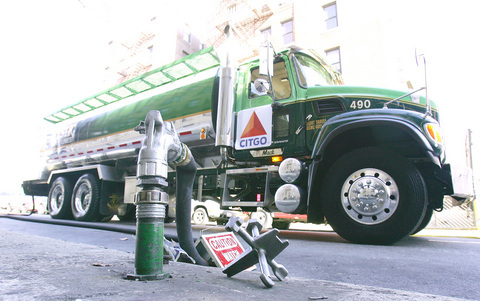Oil prices were mixed on Friday as traders pored over conflicting reports on OPEC's exports and debated whether the cartel might trim its output further.
New York's main contract, light sweet crude for delivery in December, closed down US$0.45 at US$55.81 per barrel. The contract expired on Friday.
The contract did, however, bounce back from earlier lows which had seen it plummet as low as US$54.86, its lowest point since June last year.

PHOTO: AFP
In London, Brent North Sea crude for January delivery settled up US$0.45 at US$58.99 per barrel, after earlier touching a one-year low of US$57.85.
Traders said New York prices had been bolstered by mild weather in the US and perceptions that there are ample US winter fuel supplies in place.
"This is going to put pressure on OPEC to perhaps make bigger cuts," BNP Paribas Commodity Futures broker Tom Bentz said.
The 11-member OPEC cartel decided last month to slash output by 1.2 million barrels per day to 26.3 million barrels per day from Nov. 1, in a bid to put a brake on prices which have tumbled from above US$78 this summer.
According to an analysis by consultancy Petrologistics, OPEC's exports have fallen 1.1 million barrels per day this month.
A separate report by Oil Movements, however, estimated that the cartel's exports actually rose by 210,000 barrels per day starting Nov. 4 and were likely to remain at such a level through to Dec. 2.
"Further [price] weakness no doubt came from data from oil tanker tracker Petrologistics, which suggested that the cartel has carried out only some of their agreed output cuts," Sucden analyst Michael Davies added.
"The data has undermined OPEC's credibility, with many more now questioning whether OPEC will deliver its planned 1.2 million barrels per day cuts," he said.
The US Department of Energy revealed earlier this week that stockpiles of distillates, which include heating fuel and diesel, dived 3.6 million barrels to 135 million barrels in the week ending Nov. 10.
That was more than seven times market expectations, but stocks remain about 6 percent above year-ago levels.
Heating fuel demand ratchets up a gear during the northern hemisphere winter, particularly in the US northeast, pushing oil prices up.
And many Americans take to their cars for the Thanksgiving holiday next week, when analysts predict that demand for gasoline will shoot higher.

The Eurovision Song Contest has seen a surge in punter interest at the bookmakers, becoming a major betting event, experts said ahead of last night’s giant glamfest in Basel. “Eurovision has quietly become one of the biggest betting events of the year,” said Tomi Huttunen, senior manager of the Online Computer Finland (OCS) betting and casino platform. Betting sites have long been used to gauge which way voters might be leaning ahead of the world’s biggest televised live music event. However, bookmakers highlight a huge increase in engagement in recent years — and this year in particular. “We’ve already passed 2023’s total activity and

Nvidia Corp CEO Jensen Huang (黃仁勳) today announced that his company has selected "Beitou Shilin" in Taipei for its new Taiwan office, called Nvidia Constellation, putting an end to months of speculation. Industry sources have said that the tech giant has been eyeing the Beitou Shilin Science Park as the site of its new overseas headquarters, and speculated that the new headquarters would be built on two plots of land designated as "T17" and "T18," which span 3.89 hectares in the park. "I think it's time for us to reveal one of the largest products we've ever built," Huang said near the

China yesterday announced anti-dumping duties as high as 74.9 percent on imports of polyoxymethylene (POM) copolymers, a type of engineering plastic, from Taiwan, the US, the EU and Japan. The Chinese Ministry of Commerce’s findings conclude a probe launched in May last year, shortly after the US sharply increased tariffs on Chinese electric vehicles, computer chips and other imports. POM copolymers can partially replace metals such as copper and zinc, and have various applications, including in auto parts, electronics and medical equipment, the Chinese ministry has said. In January, it said initial investigations had determined that dumping was taking place, and implemented preliminary

Intel Corp yesterday reinforced its determination to strengthen its partnerships with Taiwan’s ecosystem partners including original-electronic-manufacturing (OEM) companies such as Hon Hai Precision Industry Co (鴻海精密) and chipmaker United Microelectronics Corp (UMC, 聯電). “Tonight marks a new beginning. We renew our new partnership with Taiwan ecosystem,” Intel new chief executive officer Tan Lip-bu (陳立武) said at a dinner with representatives from the company’s local partners, celebrating the 40th anniversary of the US chip giant’s presence in Taiwan. Tan took the reins at Intel six weeks ago aiming to reform the chipmaker and revive its past glory. This is the first time Tan